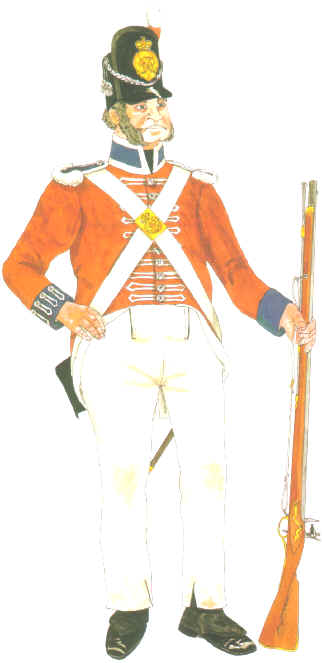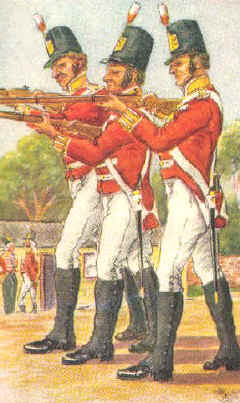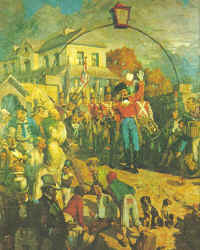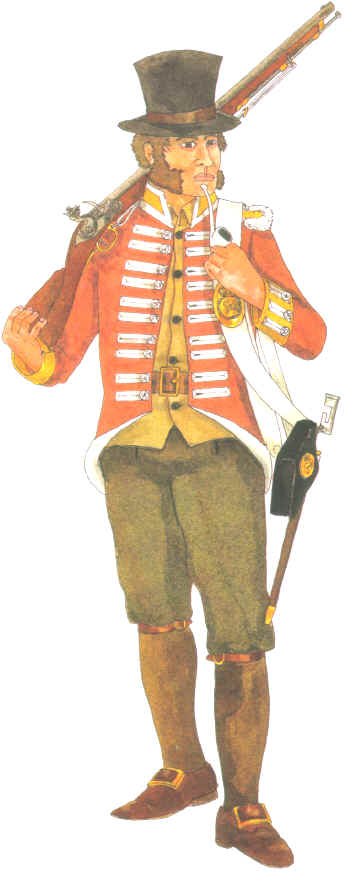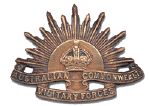 |
|
|||
|
|
||||
|
The ARMY in AUSTRALIA before WATERLOO |
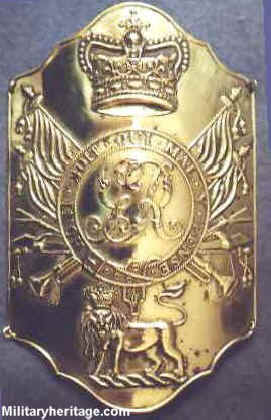 |
By Crayton BURNS, First A.I.F.
The early history of the Australian Military Forces offers engrossing reading to the student whose interest takes him back to those turbulent days of the late 1780s. What is considered by many to be the first chapter of the military history of Australia begins then and extends into 1870. <<< Hat badge of the "Loyals"; The Loyal Sydney and Parramatta Association. |
|
In this phase is given an early microcosm of things to come-immediate conflict between civil and military authority; what happens when a garrison has not enough work to do; the first mutiny and its consequences; the first Volunteer Militia (on the whole a creditable phase in an otherwise disgraceful record); the first Veterans Corps (photo below right); the first land settlement plan for soldiers; and the first pensions claims. |
When Captain Arthur Phillip, RN, arrived in 1788 with a commission as Governor and Captain-General to plant a penal colony in New South Wales he brought 564 men and 591 women, all convicts, packed in six sailing ships also 168 marines and ten officers to maintain order. From the beginning to the end of his term he encountered more trouble from the Marines than from the convicts. The Royal Marines comprised four companies under the command of Major Robert Ross, having, as subordinate officers Captains James Campbell and John Shea; Captain Lieutenants James Meredith and Watkin Tench; Lieutenants George Johnston, John Creswell, John Kellew, John Poulden, John Johnston, James Maitland Shaipe, Thomas Davey and Thomas Timmins; Second Lieutenants Ralph Clarke, William Dawes and William Faddy; Adjutant II John Long, Quartermaster-Lieutenant James Frazer (Furzer ?); Judge-Advocate David Collins; as well as five medical men (probably orderlies), a few mechanics, and forty wives of marines (free citizens) and their thirteen children.
There is nothing in the early records to show that the Marines were given any real work of survey, construction, or exploration beyond supervision of chain gangs and the general chores of prison warders. Their morale deteriorated rapidly. Friction arose immediately among the officers; there was discontent in the ranks and numerous thefts from stores. Within three months Major Ross was openly defying the authority of the Governor, whom he informed that officers of the Marines must refuse to sit on the Criminal Courts, which appear to have acted as a quasi-military jurisdiction. The Marines, Major Ross declared, recognized only the authority of the Admiralty. In a letter dated 27 October 1788, Phillip reported the facts to Lord Sydney, Secretary of State, who, having already heard rumours of insubordination, acted promptly and advised Phillip that the recalcitrant Marines would be recalled and replaced by a special Corps raised in England for service in Sydney. Any rank and file of Marines who could be induced to enlist in the New South Wales Corps would receive a bounty of £3 each and were assured after five years' service of a grant of land, tools from the stores, seed, and sustenance for the first year. It is not clear exactly how many availed themselves of this offer but a parade on 24 July 1790 showed eleven officers and 117 men present. A War Office order five years later directed that the Marines then remaining should be incorporated in a company of the N.S.W. Corps under Captain-Lieutenant George Johnston and Ensign T. Davis.
This, presumably, was the pay of the N.S.W. Corps also and might in a small degree excuse the trafficking in liquor by which they set about augmenting this meagre income. The first companies of the N.S.W. Corps, having arrived with the Second Fleet on 28 June 1790, soon became implicated in wholesale trafficking in "rum", as all wines and alcoholic spirits were called. Phillip informed the Secretary of State that the behaviour of the Corps was worse than that of their predecessors, the Marines. They quarrelled among themselves and with the emancipated settlers; they persistently defied authority. Efforts to quell the rum traffic, which superseded all other forms of currency and trading and gave rise to chicanery and debauchery, proved too much for Phillip's efforts to maintain a semblance of order. At his own request he left for England on 21 November 1792 seeking "a change of air, at least for a time". He resigned formally in July the following year, having given his best efforts in an extremely difficult assignment. Controversy has existed as to the qualifications of the officers of the Rum Corps, as it became colloquially known, but the records refute the suggestion of many writers that these officers had no previous military training. The order in the London Gazette of 24 October 1789 creating the Corps and appointing its officers shows that all except Ensigns John Thomas Prentice, Francis Kirby and C. de Cottrell were officers of regiments of good repute, including the 6th, 50th, 60th, 68th, 73rd and 96th Regiments of Foot. These original officers were: To be major commanding: Captain Francis Grose; to be captains in command of companies: Lieutenants Nicholas Nepean, William Hill and William Paterson; to be lieutenants: Edward Abbott and John Townson and Ensigns John Macarthur and Joseph Foveaux. Much more was to be heard of Ensign Macarthur. The rank and file of the N.S.W. Corps were recruited from the military prisons of England. For two years between the departure of Phillip and the arrival of his successor, Captain John Hunter, RN, in September 1795 the facade of military law was preserved in Sydney by this unlikely material, first under Major Grose and later under Captain Paterson. Behind this facade the Corps established a monopoly in the rum traffic which was a curse and a calamity to the expanding colony. The effects took many years to mitigate and ultimately led to rebellion.
This communication Hunter reinforced three weeks later by an order published in the Government Gazette assuring all persons in the Colony of his "determination to preserve order and tranquillity by every means which the law can furnish". But it was of little use. Within another six months he was obliged officially to bring to the notice of the British Government the "violent and extraordinary conduct" of the N.S.W. Corps, and to remark that the manner in which they had been recruited "does in a measure weaken the effect on service which one would expect to derive from the assistance of the military". Some of them he declared "the most atrocious characters that ever disgraced human nature". The response from England was to augment the Corps, partly from the same unlikely material - men who were in military prisons because they were considered to have disgraced their regiments - and partly from emancipated convicts. The strength of the Corps was to be raised from three companies to ten. An accompanying order contained the first proposals for an expeditionary force based on Australia. Four companies of eighty-five rank and file each were to be "held in readiness for active service overseas" under Major Paterson. Where they were intended to go was not stated, but there is a presumption that an expedition was projected against the Spanish settlements in the Philippines. It did not go; the grip on the Colony by the Corps intensified. Hunter had failed. He was recalled to England and Captain Philip Gidley King, RN, who was deemed by the Admiralty to be a much stronger man, took over as Governor with stringent orders to suppress the rum traffic and restore discipline. King proceeded at the outset with vigorous measures. He imposed stringent restrictions on the sale and importation of spirits, issued permits and licences, and fixed maximum quantities. Importers and traders raised a storm of protest and the embittered and disaffected officers of the Corps allied themselves more compactly against the Governor. After six years he, too, was forced to admit in despatches that every step which he took clashed so much with the interests of trading individuals, both commissioned and non-commissioned officers, soldiers and private persons, that all set their wits to work, not only to thwart his exertions but to use every measure that art, cunning and fraud could devise to impede his efforts. Worn out by the struggle, he was superseded by Captain William Bligh, RN. " Bligh of the Bounty" who was held in very high esteem at the Admiralty as one of the heroes of Copenhagen, an intrepid navigator and a disciplinarian. King's term did contain two noteworthy events. In 1802 during a lull in the wars against the French, the British Government decided upon drastic retrenchments of the military forces. King was instructed to induce as many men as possible to accept discharge from the Corps and settle on the land as an alternative to being sent back to England.
These grants were free of taxation, quit rents and other dues for ten years, and thereafter liable to a nominal rent of I/- to 2/- per fifty acres. In addition the grantees were to be fed and clothed for a year, to receive tools and seed from the public stores for the same period and to be allowed the service of such convicts as the Governor thought fit. It is not disclosed how many availed themselves of this, the first soldier settlement proposal in Australia, but many undoubtedly did with varying fortunes. The weakness of the scheme lay in the fact that no consideration was given to varying quality of land. There was wide scope for patronage and favouritism in the selection of land and the allocation of convict labour.
Acknowledgment is freely and gratefully made for use in the foregoing article of material which was gathered together by the late Mr R. K. Peacock, for many years Defence Librarian. He put the result of years of research into some notes entitled The Imperial Troops from 1788 to 1870, now preserved in the Australian War Memorial at Canberra.
|
||||||||||||||||||||||||||||||||||||||||||||||||
|
From
the article The
Royal Veterans in Australia by
R. H. Montague, Journal of the Royal Australian Historical Society,
December 1982, Vol. 68 Pt 3, pp 238-246 it provides the following
information on the establishment of the first Veteran Company but does
not mention the second time it was established. "The
first Veteran Company was established in 1810. When Lachlan Macquarie
arrived he quickly turned his attention to matters of defence.
The 73rd Regiment, which had sailed with him from England, was
greatly under strength and Macquarie hoped that its numbers might be
augmented by volunteers from the out-going regiment, the 102nd, formerly
the notorious New South Wales Corps.
The age limit for transfer into the 73rd was thirty-five and the
Governor was well aware that the vast majority of 102nd men were past
that age. The solution was
to form the older men into an Invalid or Veteran company and the British
government readily agreed, especially when it could see a saving in
expenditure. A dispatch
from Governor Macquarie was worded in the following terms: 'A
great number of Old soldiers of the 102nd who had served long in the
Country wishing to remain in it on Account of Connexions they have
formed with Convict Women, and by whom they have had Children.
I have taken the Responsibility upon Myself of forming them into
an Invalid or Veteran Company for the Service of the Colony, until His
Majesty's Pleasure shall be known: and I trust Your Lordship will be
pleased to move the King to be graciously pleased to sanction and
approve of the Measure. I
have made the Establishment of the Invalid Company One Hundred Rank and
File with the usual Proportion of Serjeants and Drummers, to be under
the Command and Charge of an Officer of the 73rd Regiment until I shall
receive orders from home respecting it.
Independent of gratifying these poor Old Soldiers in permitting
them to remain with their Families, and in a Country they are much
attached to, the Measure will be a very Considerable Saving to the Crown
as from their great Length of Service, most of them having served
between twenty and thirty Years, they would be entitled to very high
Pensions on their arrival at home and being discharged for very few of
them would be found fit for Service in a Cold Climate.' "Approval
was given on the condition that the Veteran Company was to be attached
to the 73rd Regiment or any other regiment which might be doing duty in
the Colony. The War Office decreed also that it should be dressed in the
same manner as the 73rd except that the dark green collars and cuffs
would be replaced by those made of dark blue cloth which distinguishes a
Royal Corps." Ron
Montague does not say when this company was disbanded, except to say
that in 1817 Governor Macquarie urged the War Office to disband the
Company because the men were 'generally quite worn out through Long
Service, age or infirmities'. But
no action was taken. In
1822 Governor Brisbane made a similar appeal but once again no response
from London. From this
article it is unclear when this first Veterans Company was disbanded. (see
above for a claim that it was 24 Sep 1882) There is no mention of a second Veteran unit being established in the 1820's. (It is my belief that there were only ever 2 Veterans Units raised. The 1st as above and the so called 3rd as below. The so called 2nd was in my opinion the 1st re-organised after complaints from Macquarie in 1817. webmaster) In
a paper given to Mike Boyd by Mr Graham Thom on 7 February 1983 he said
he had a record of a proclamation issued on 12 September 1825 in London
(reference not known and given to him by a Canberra Society member). 'His
Majesty, King George IV, has approved the formation of three Veteran
Companies, for service in New South Wales and Van Dieman's Land .....
for the purpose of being employed as superintendents and overseers of
convicts in addition to their military duty, and such companies should
consist of volunteers of the out-pensions (of Chelsea hospital), who
shall have borne good characters while in the army, whose subsequent
conduct shall have been such as to recommend them for the service in
question; a preference however being given to those pensioners who were
discharged as non commissioned officers, or who have acted in that
capacity. 'Notice
is hereby given that such out-pensioners of the aforesaid description as
reside in London or its neighbourhood, and may be desirous of
volunteering their services in the said companies, are to signify their
intentions to the Field Officer who will be appointed to examine them,
and who will attend at the board room of the Hospital for that purpose
between the hours of ten o'clock in the forenoon, and three o'clock in
the afternoon, on the undermentioned days, viz.
And
such out-pensioners are at the same time to produce to the said field
officer certificates from the minister and officers of the parish where
they reside, or from some other respectable persons, to the effect that
their conduct and habits have been such as to qualify them for the
employment above described. 'In
consideration of the duties to be assigned to the volunteers who may be
selected for this service, they will be allowed full pay of cavalry,
viz.
together
with free rations; and they will likewise, in case of their reverting to
the out-pension at any future period, be allowed to reckon the term they
may have served in the said companies, in addition to their previous
service in the army, with a view to obtaining any increase of pension to
which such additional service may entitle under the regulation now in
force. 'It is to be observed that this notice does not extend to such men as by the hospital books exceed fifty years of age, or who have lost a limb, or who labour under any serious bodily infirmity. Pensioners
eligible in other respects will not be objected to
on account of their having families, if not too numerous. By order of the Lords and other Commissioners. Richard Neave, Secretary and Registrar.'12 September 1825 From
the Australian Joint Copying Project series WO12, reel 3917, piece 11230
under the Muster Lists for the Royal New South Wales Veteran Company it
had the following memorandum at the beginning of the Muster Rolls "The
original New South Wales Veteran Company was disbanded in 1823. (see
above for claim it was 24 Sept 1882) "The
New South Wales Veteran Companies were formed on the 24 September 1825. The accounts are understood to have been conduced to the
Audit Office to 24 December 1827. Pay
lists were sent to the War office from the 25op. that month.
The companies were disbanded in 1831. "The
present volume contains all the Pay lists of the Companies sent to the War
Office, and all the Adjutants Rolls which were ??? ordered to the War
Office. signed J P ? 18/10/1834" LAND
GRANTS
From
Royal Veterans, by R H Montague, Journal of the Australian Historical
Society, December 1982, p 242, it provided the following outline of the
land grants:- "The
conditions that were laid down for issuing land grants to Royal Veterans
were broadly the same as those applied to the First Fleet Marines some
forty years earlier. The new
conditions were set out in a Memorandum signed by Ralph Darling on 13
January 1829, and worded as follows: It
being intended to discharge part of the men of the Royal Veteran
Companies, the following indulgences will be granted to such as are
desirous of settling on farms in the country:- (1)
Each man will be allowed from 40 to 100 acres of land according to the
quality of the soil and the situation in which he may be required to
settle on his entering into a bond that he will reside on and cultivate
his land for a period of seven years on pain of forfeiture. (2)He
will be furnished with all the necessary implements of husbandry. (3)
If married he will receive a cow from the Government herd on taking
possession of the land and a second cow at any time within three years
when he shall have cleared and stumped ten acres. (4)
Each man will be allowed the usual rations (spirits excepted) for himself
and his family for 12 months from the day of his discharge to be issued at
or in the neighbourhood of his farm.
The ration to be forfeited if he or his family absent himself or
themselves from the farm. (5)
A log hut will be put up for the accommodation of such men as are married. (6)
It is intended that these men shall be located in different parts of the
Colony in small bodies of about six
in number as soon as eligible situations have been determined on, and it
is desirable that the individuals be of different trades, as being more
likely to prove generally useful to the Colony, and afford them an
opportunity of providing comfortably for themselves and families.
Signed (R. D.)" This article, p 243, said that plots of land were measured out at Oakhampton, near Maitland, Wollombi near Cessnock, Goulburn Plains, along the banks of the Wollondilly River and some small plots of land at Newcastle.
Extract from a
letter written by William Hunt of this town who went out at the latter end
of last year, as a private in the Royal Veteran Company, for New South
Wales. The letter is
addressed to Mr Samuel Preston of Nottingham who has obligingly favoured
us with it:- "Hobart
Town, Van Dieman's Land 20
March 1827 Dear Friends, We had a very fine passage from Spithead to New South Wales. We had a very fresh breeze of wind through the English Channel, which made my daughter very sea-sick for the first fortnight, but she never was sick afterwards; my wife never was sick at all, and it is needless to say I never was sick. I wrote to you before we arrived at Portsmouth and stated the particulars of our situation on board which was very comfortable, as we had a large birth to ourselves; we had room enough in it to put one of our boxes which we slept in, in the birth, all the passage, and the other box we kept in the sick-bay, so that we had all our stores under our eyes. There were ten women brought to bed on the passage. We had the small pox and measles on board and we buried twelve children and one women during the passage; we had very few men sick. We anchored in Sidney Cove the 8th of July which was four months to the day from the time we left Spithead. We had no particular accident occurred worthy of notice during the passage. When we arrived at Sidney there was no place provided for our reception but they soon set to work, and cleaned out a part of soldiery barracks, and an orphan school that had been unoccupied for some time, so that in two days all was ready and we went on shore, and soon made ourselves very comfortable. As we sung out for the grog, and got our rations, which was fresh beef, so we struck up a tune on the frying pan and were all jovial together. Mrs Plowright died at Sidney four months before we arrived there; she died very suddenly. The first man that spoke to me was a Nottingham man, to ask me if we had any from Nottingham belonging to our corps; his heart leapt for joy when I told him I was from Nottingham and while we were talking, John Sinter's son came up, so they helped me with my boxes and luggage; the man's name was Daniel Smeeton; he was 14 when he left Nottingham and was for seven years; he is a free man this month; he was the same trade as me, but he has learned stone-cutting since he has been in Sidney, and was getting 2 pound a week, set wages, when I saw him. We went to old Jack Slater's the next day, and had a jovial carouse. Slater is a prisoner for life but he has got a ticket of leave, so that he does no Government work as long as he gets into no trouble; they are doing very well. His wife has had a son since she arrived in Sidney so that they have two sons and two daughters; the eldest son is as tall as his father. Sarah the eldest is at home with the others; the other daughter is in service, in the same place as she went to when she first came into the colony. I can assure you, by being eye-witness, a prisoner in these colonies is no joke, for they work twelve hours a day for Government, five days in the week and they have only Saturday for themselves, so that it is not now as it used to be. We were at Sidney three weeks when our company were ordered for this place where we arrived in seventeen days. It is 700 miles from Sidney and that nearer to England. We
have very good rations, all fresh meat, beef and mutton.
My allowance is seven pounds of meat and seven pounds of bread per
week, and one quart of rum every six days
(1.2 litres) and my wife's three pounds and a half of each, and my
daughters' one-third, that is, one pound of each every third day.
Women and children are allowed no liquor - the worse for me.
We draw our liquor every Saturday, which makes a good Saturday
night, then good-bye for a week. Our
pay we receive twice a month. For
further particulars, I must refer you to Wm Shaw, in his letter.
Our kind love to your wife and Susan and her husband.
Your respectfully, Wm
Hunt" From
the letter to Mr Shaw, referred to above, we extract the following:- "This Island is divided into two counties, Cornwall and Buckinghamshire; the assizes are held every quarter, at Launceston, and at this place (Hobart Town). The first assizes held here after we arrived, there were twenty-seven cast for death, four of which were reprieved and sent to a penal settlement for life, twenty three were executed - on Wednesday seven, Friday seven, and on Monday nine, which made twenty-three. There is a drop here that they can execute twelve at a time. We went to see the nine suffer, and such a sight we neither of us saw before; all of them appeared to die very penitent. They are very severe with them here, as most of their offences were for sheep-stealing. At the last assizes twelve were executed and I saw all of them. There is eleven of us here overseers over different gangs, and the rest are all over the country; the gang that I have charge of, are in chains, and are obliged to work with their irons on, according to the term of their sentence, and that is commonly from one to six months each, according to the offence, which is like crimes in the army, for being drunk or absent. My duty with them is to keep them close to work during the appointed time, and can assure you that they must work hard, for if the overseer reports any of them for neglect, they are sure of twenty-five or fifty lashes. Their allowance of provisions is one pound of bread and the same of meat (?) but no vegetables to their meat, so that they have none too much. They
have coffee morning and night, but they say it is very bad. The work my gang does is making the town streets and
levelling and gravelling them and I have the honour
to say that I have completed the first street in Hobart Town, and I
believe there are nineteen more want completing, so that if, please God, I
live and have my health, I have three years' work cut out for me.
My superintendent told me that we were to serve three years as
overseer, and then have a grant of land given to us, equal to former
settlers, and receive our pensions here, so that these three years will
just bring me in one shilling a day, if England can afford to pay it me!
I saw and drank with John Slater at Sidney; his wife and family are
with him, doing very well; they keep a shop, and sell almost every thing,
not forgetting a "drop of the creature", but I think the old man
drinks most of the profits. "We
have found many Nottingham men here, and Alfred Gelding is at this place,
and in good health, doing very well, as he is a tailor, which is one of
the best trades in the colony; and Mr Lamb's son is here, he is doing very
well; and Geo. Lackenby is here, and is very well.
We heartily wish you were all as well off as we are, for, thank
God, and my lucky stars, that we don't want for the common necessaries of
life; for we have plenty to eat and drink, and a good bed to lay upon at
night." We
have also seen two other letters from William Hunt, from which we glean
the following particulars:- "Sydney
is very pleasant town, and there is a good and well supplied market every
Thursday, and public houses are almost as thick together as in Nottingham;
rum is 1s the half-pint and plenty of good wine at 1s 3d per quart.
Vegetables are very dear; we had to pay 6d for one cabbage, and
potatoes are three halfpence a pound, bread 2d, meat 6d; tea, very good,
3s and sugar 4 1/2 per pound; soap and candles 1s per pound; very
indifferent ale 9d per quart. Wearing
apparel is very dear indeed, but the working people are paid very well for
their labour; tailors, shoemakers, bricklayers and stonemasons, can earn
from 10s to 15s per day. When
we had been at Hobart-town about a fortnight we got a place of service for
our daughter, at one of the first merchants in the colony, to nurse a
child five weeks old; her wages are 13 Pound a year, and we draw her
rations, the same as if she was with us. I fetch them from the prison barracks at half-past five in the morning, and they work till nine o'clock, and out again at ten till one, for dinner; then again from half-past two till six at night; in winter time was work from seven in the morning till five in the evening, when I take them into the barracks, where they remain till I fetch them out in the morning. As there is no place provided for me in the barracks, I am obliged to find my own quarters, though I have petitioned to the Lieutenant-Governor, and wrote to the chief Engineer of my department, but all to no effect. The other overseers in town are similarly situated. We
have two rooms upon a floor, for which I pay three shillings per week
currency, but they are very pleasantly situated, about half a mile from
town. The business I have
with my gang, is to overlook them with a stick in my hand, and to see them
work, and I am obliged to be very severe with them, to keep them properly
under; and yet they say I am the best overseer they ever had, for were I
to make the least report against them for being idle, they would get
five-and-twenty or fifty lashes, so that I abstain reporting them as much
as possible, for whatever the overseer says is law." |

